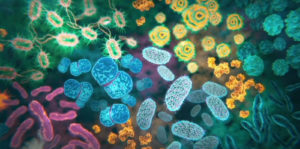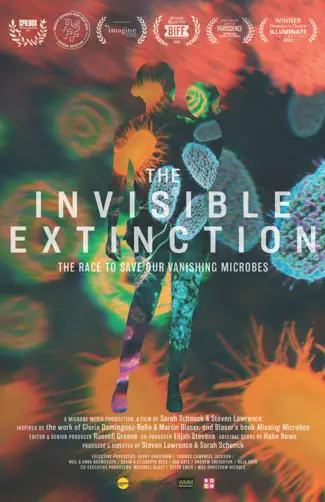
I enjoy a documentary that dares to challenge conventional wisdom. Fat Fiction questions the facts surrounding the low-fat, low-cholesterol diet. To Which We Belong asserts that we’re fighting climate change on the wrong front, and we should be focusing our attention on the soil and not the air. Co-writers/co-directors Steven Lawrence and Sarah Schenck’s documentary, The Invisible Extinction, wonders if our overdependence on antibiotics is actually doing more harm than good.
Most of us would agree antibiotics are a good thing. They help fight infections and harmful bacteria. It only makes sense that a healthy body is void of all bacteria and other “harmful” microorganisms. But what if we’re wrong?
The Invisible Extinction follows the work of two scientists, Martin Blaser and his work and life partner Gloria Dominguez-Bello, who suppose that though antibiotics kill harmful bacteria in our bodies, they also kill beneficial bacteria or microbes. They believe the intentional elimination of microbes through antibiotics has caused a massive rise in diabetes, life-threatening food allergies, obesity, and asthma. This theory is documented in Martin Blaser’s book, Missing Microbes: How the Overuse of Antibiotics Is Fueling Our Modern Plagues. The basic idea behind this theory is that medical practitioners overprescribe antibiotics not only to kill infections and bacteria but also for our own “safety,” almost as if it’s aspirin. Blaser and Dominguez-Bello show us that this practice is particularly harmful to children.

“…though antibiotics kill harmful bacteria in our bodies, they also kill beneficial bacteria or microbes.”
Think about it. A baby or young child is at its weakest, and it only makes sense to use antibiotics to stop the growth of bacteria to strengthen their immune systems. But doesn’t it also make sense that the only way to enhance a child’s immune system is to expose them to a wide variety of bacteria in small doses? Blaser and Dominguez-Bello assert that there are, in fact, beneficial bacteria and that they quell the formation of severe and deadly food allergies, diabetes, and possibly even autism.
These assertions are deep into the research phase. Still, common sense would tell us that the human body is amazingly resilient, and tinkering with the natural development of children (even for safety) may be doing more harm than good. Much of The Invisible Extinction follows the two scientist’s research into identifying the beneficial microbes in our body, finding the missing microbes in a person with severe allergies and ailments, and reintroducing those microbes to their system. Dominguez-Bello has also been working with a microbe vault in Switzerland, modeled after the Arctic Svalbard seed vault that stores all of the Earth’s seeds (in case of a catastrophic event). She has convinced them to start samples of beneficial microbes as well.
I’m a movie critic, not a scientist. What I find fascinating about this documentary is the fact that it dares to challenge conventional wisdom when set against an alarming growth in childhood food allergies and diabetes. It also calls into question the idea that science knows more about the human body than, well, the human body.
If anything, I’m drawn to any film that makes me think and challenge what I’ve always believed was true. Not necessarily because decades of “conventional wisdom” is wrong, but because by practice, we should question everything, whether to strengthen our current beliefs or discover the need to modify those beliefs to reflect the truth. Steven Lawrence and Sarah Schenck’s The Invisible Extinction does exactly that and is worth watching for the sake of our health and the health of our families.
For screening information, visit The Invisible Extinction‘s official website.

"…worth watching for the sake of our health and the health of our families."




